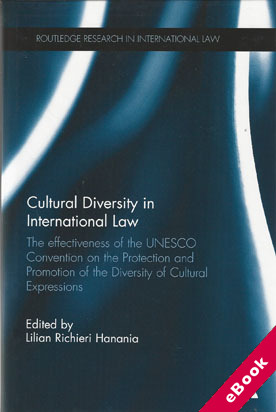
The device(s) you use to access the eBook content must be authorized with an Adobe ID before you download the product otherwise it will fail to register correctly.
For further information see https://www.wildy.com/ebook-formats
Once the order is confirmed an automated e-mail will be sent to you to allow you to download the eBook.
All eBooks are supplied firm sale and cannot be returned. If you believe there is a fault with your eBook then contact us on ebooks@wildy.com and we will help in resolving the issue. This does not affect your statutory rights.
The UNESCO Convention on the Protection and Promotion of the Diversity of Cultural Expressions was adopted in 2005, an instrument designed to allow States to protect and promote cultural industries especially when these may be considered to be threatened by international trade agreements.
This book examines the effectiveness of the Convention, not only from a trade and culture standpoint, but also regarding international cooperation and development for cultural diversity, a field that has developed remarkably since the entry into force of the Convention in 2007.
The first part of the book assesses the obligatory nature and the effectiveness of the Convention provisions, mainly from the perspective of the trade and culture debate. The practical implementation of the Convention is to a large degree dependent on the operational guidelines that have been issued by the Convention's bodies so the legal nature of those operational guidelines and their capacity to determine obligations under the Convention and increase its application by Parties are examined.
The contributors also consider the Convention's potential to legally influence International Law looking at several recent situations where Parties have resorted to the Convention in order to address trade and cultural concerns. Part two explores to which the extent to which recourse to the Convention outside the trade and culture debate may contribute to the acknowledgement of its legitimacy and to its strengthening in international law, leading ultimately to increasing its normativity. Chapters focus on different concrete experiences and initiatives regarding the promotion of international cooperation and the integration of culture in development programs.